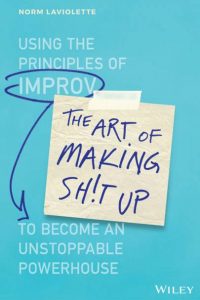Probably one of the hardest things to do is to stand in front of an audience and do live improv. You never know whether it will work this time and the feedback loop is imminent.
It’s an excellent platform to learn and get better with practice: if you have the guts to fail, and the courage to come back and try again. And again. The biggest secret is not to give up and grow a thicker skin. You cannot please everyone and you’re not as important as you think. Swallow your pride and own your performance. Even the best comedians suck at times.
Norm Laviolette shares his wisdom and some industry knowledge that is useful in business but also in regular life. If improv is hard so is his message as well. Not because the topic is difficult to understand but because the things sound so obvious and simple, yet so hard to carry out in practice.
How many of us are free from the fear of judgement of others and ourselves? Creative freedom flourishes when we are not hitting the internal breaks. Imagine yourself on stage on a spotlight and you only not have to perform but to entertain the audience as well.
How do you come up with something funny? The technique is very simple and useful. You just listen to what has been said to you (by the audience or if you’re performing with someone else on stage). Don’t think something clever to say but listen and understand what has been said to you.
In a word: respond and continue the dialogue. Appreciate what has been said and embrace the offered ideas even though they are not yours. Build something new from what has been said to you.
You don’t need to come up with new topics or clever ideas while the other person is talking. Nor should you drift away in thoughts or assume what has been said to you while you are still listening.
Sounds familiar? These are the things that happen everyday in meetings. People are having separate monologues and nobody is really having a genuine dialogue and trying to understand the wisdom in other people’s messages.
Yet, this is how successful improv, and negotiators, work. You actively focus and keep an eye contact to other person. Unexpected creative sparks happen when you just respond to the situation rather than try to push your pre-thought out agenda.
Another hard thing to do is to allow other people to modify your ideas. Everybody loves their ideas and it’s no fun to see them changed or even improved. Letting go allows something better to be created and the story to move on.
Improv sounds a lot like teamwork and day-to-day business life sans the stage fright, and the explicit comedy.

